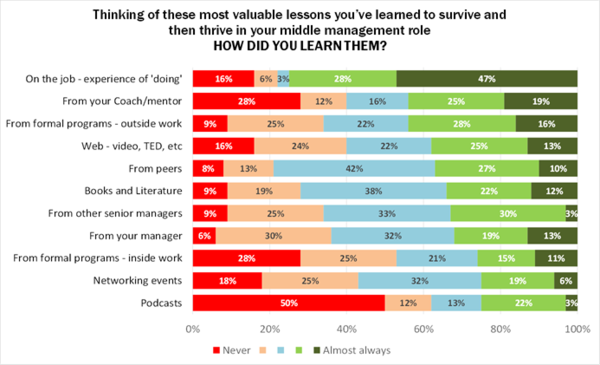Recently, we surveyed a collection of middle managers and their managers.
We wanted to know: in what areas do middle managers think they need coaching and development – and do their managers see other areas where more development is needed? Alongside that, we wanted to test our assumptions about how middle managers might learn most effectively, based on approaches we’ve successfully used for frontline and executive learning.
Read this article to find out:
- What are the four most immediate issues faced by middle management?
- Are middle managers as capable as they think they are?
- Do middle managers stifle innovation, and what can you do about it?
- What six principles should you follow to build a coaching program for middle management?
What are the four biggest challenges for middle management?
Middle managers worry about four issues:
-
Being ‘the meat in the sandwich’. Middle managers are expected to drive strategy created by more senior management. They may not agree with the plan, but they have little ability to change it – which causes stress and frustration.
-
Workload and deadlines. Middle manager are asked to deliver ever-greater workloads, in ever-shortening time frames. It’s common – and, again, stressful – to face pressure and limited resources.
-
Managing the managers. It’s a constant challenge to be properly heard by senior management. Many middle managers report to more than one boss, which further complicates messaging and creates cynicism. Middle managers often feel the expectations of management are unreasonable.
-
Managing complex peer and team relationships. Middle managers operate in complex, multi-layered environments. It’s hard, difficult work to manage their own team, let alone its interaction with other teams.
In addition, six development issues were identified by the managers of middle managers:
-
The skills gap. Most middle managers have significant leadership gaps. They may be strongly capable operationally, but will usually have gaps outside their discipline: strategy, people leadership, leading change, high level business decision making and general commercial acumen.
-
Resistance to innovation. As deployment and execution specialists, middle managers can struggle with innovation. In fact, we believe middle managers often impede innovative ideas passing from the front line to the senior reaches of an organisation.
-
Conflicting mandates. Middle managers must drive innovation, maintain continual improvement and increase employee engagement while keeping costs down, managing the scope of their team and seeking efficiencies. It’s a lot.
-
Forward planning. Middle management are often the last to know about new plans, yet they are expected to be a conduit of an avalanche of information upward and downward.
-
Blind spots. A lack of data-driven assessment and profiling can leave a middle manager with blind spots. It’s essential to use assessment, goal-setting and responsibility to build self-awareness.
-
Leading change. Like everyone else, middle mangers struggle to lead change. And their position is complicated further when they do not agree with a corporate strategy they have no choice but to deploy.
How do you change middle management behaviour?
Alongside asking about the challenges of their role, we asked middle managers how best they learn.
No-one, funnily enough, said “I like to watch a presenter read out powerpoint slides”.

Learning by doing was by far the most effective and popular method, which sometimes coaches mistake for “throw in a few role plays”. That’s unlikely to be enough. To get real, deep involvement, you need to achieve six goals.
-
Illuminate. An assessment helps a middle manager understand how they are experienced as a leader, and how their personality and background impact their leadership style. Without assessment, it’s unlikely you can create a “burning platform” for improvement.
-
Envision. It’s unproductive to endlessly focus on past mistakes. You’ll see better results explaining that “what got them here” is unlikely by itself to “get them there”, encouraging a workshop participant to consider smarter approaches.
-
Practice. Middle managers usually believe they are doing a better job, and are more competent, than they generally are. We often see middle and senior leaders who “know the theory but don’t deploy consistently”. For instance: the leader has been on a coaching course and knows the principles of Leader as Coach, but they continue to direct or mentor rather than consistently stepping up a level to coach. Debriefing a live situation helps a manager understand the gap between how they currently behave and best practice.
-
Apply. Our experience is that middle managers love to gather new language and models so long as they’re not actually accountable for their deployment. But you can’t create change with a theoretical or academic approach.
It’s critical to work with challenges that are immediately applicable to the work place, which solve current problems. But afterward you must also hold the manager accountable for delivering outcomes. (This approach, helpfully, has a secondary benefit: it makes it far easier to measure the ROI of Organisational Development programs).
-
Aspire. The quickest, most effective way to get the attention of middle managers to link learning to the goal of “getting to General Manager”. Putting workshop participants in the GM’s chair, and asking what would they do, is always extremely well received, as are company specific simulations that help a participant understand decision-making at a higher level. For example, for our client Evolution Mining we designed a gold mine simulation: “do we mothball, develop, or close this gold mine?”. That scores the “most liked” element of every program in which we use it – and it’s a style of simulation that is less difficult to develop that most people realise.
-
Focus. Often we find that middle managers are so closely engaged in executing business imperatives and KPIs that they lose sight of the strategic intent of their organisation. We try and help them focus on joining the dots to strategy – and to make sure they understand that being earmarked by the talent team as a person who get strategy is a surefire way to get promoted.
Why the survey?
So why did we run this survey, you might ask? HFL Leadership for some time has run a coaching program for frontline management called Fastlead. It’s what we call a “pod” or small-group coaching program that’s highly personalised, in that participants choose the challenges they want to overcome from a list of topics (agreed previously with senior management, to keep everyone on track).
Coaching is delivered in groups no larger than five with a strong role-play component, and the same set of participants will work together for six months to a year across their program.
We use small-group coaching because its participants:
-
Are able to study challenges that they’re facing right now
-
Can role play how they could better approach real-life issues, with others in their organisation who face similar issues and a Fastlead coach
-
Gain an understanding of the issues facing other silos in their business.
Fastlead has been very successful for frontline coaching, to the point where we’re been asked an embarrassing number of times by clients to build a similar program for middle managers.
We’re calling this new program Fastlead Plus, and it launches this month. The approach is still Fastlead: we favour small groups, ask participants to select what they want to study, and work on real-life challenges. But the content is very different because as you can see from the survey results, middle managers face very different issues to the frontline.
Learn about the Fastlead Plus by downloading the brochure below.
And if you need to save hundreds of hours of development time, or de-risk your organisational design and talent development, please ask us to contact you about Fastlead for frontline leaders, and the new Fastlead Plus program for middle management.




